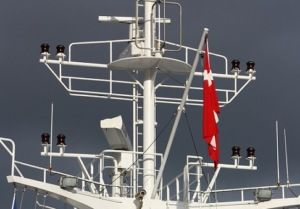News
Business News in Brief: All sails set fair for Danish fleet expansion
This article is more than 8 years old.
In other stories, Danish aid is pledged to Niger and Syria and a pension company buy-out across the Sound

Danish shipping is proudly flying the flag (photo: Pixabay/steenml)
Danish shipping companies are expanding. Over the last six months, the Danish-flagged fleet has increased by 800,000 GRT (gross register tonnage) and also moved up the world rankings from 14th to 13th place in terms of total tonnage, reports DanishShipping.
The shipping organisation sees this as a very positive sign. “When we move up the list of flag states, it is an indicator we are an attractive country in which to have ships and that having many ships creates more work in Denmark, including jobs on land,” said Anne H Steffensen, the CEO of the Danish shipowners’ association, Danske Rederier.
Although there is still some way to go to reach the top of the table, where Panama is first with 220 million GRT, there are good reasons to pick Denmark as a flag state. One of these is the fact that the registration fee for ships that are sold on has recently been abolished.
“If we want to grow further as a flag state, Denmark has to remain competitive. In that regards, it is extremely important that a majority in Parliament has decided to scrap the registration fee for ships as this is a major factor when ship owners choose where to flag their vessels,” said Steffensen. “With this change, we expect the Danish fleet to continue to grow in the coming years.”
Danish aid to Niger stepped up …
Yesterday, at an international conference in Paris, Denmark announced the inauguration of a new 380 million kroner aid program to Niger, one of the poorest countries in the world. The development minister, Ulla Tørnøas, said that with the program “we will continue our efforts to strengthen the rights of women and girls and combat poverty in Niger.” The aid should also contribute to stabilising the country and the Sahel region in general. Since the collapse of Libya, this region has been in the international spotlight, not least as Niger is an important transit country for illegal migrants from West Africa on their way to Europe. The country also has the most rapid population growth and youngest average population in the world.
… and more money to Syrian refugees
Today, the Danish development minister, Ulla Tørnæas, will open a Danish Red Cross conference in Syria. Due to the conflict there, which has now been going on for seven years, 5.5 million people have fled the country – with the majority going to neighbouring countries. It is estimated that around 18 million people remain in the country and of those around 13 million need aid. The situation is especially dire for vulnerable groups, such as the 5.3 million children. “I’ve decided to contribute an extra 85 million kroner to help alleviate the tremendous humanitarian needs that the Syrian conflict has created,” said Tørnæs. The money is to be shared amongst the aid organisations Dansk Flygtningehjælp, Red Barnet, Dansk Røde Kors, Folkekirkens Nødhjælp, Caritas and ADRA.
Danish pension company snaps up Swedish rival
Denmark’s largest pension firm, Danica Pension, has just bought SEB Pension from the Swedish banking concern SEB Bank for 6.5 billion kroner. The Danish company, which is owned by Danske Bank, has now acquired 235,000 new customers as well as 275 employees, reports DR Nyheder. “The deal will allow us more room for development so that in future we will be able to deliver the right product to our customers in the pension and insurance sector,” said Per Klitgård, the CEO of Danica Pensions. In the first nine months of the year, SEB Pension made a net profit of 389 million kroner and manages resources of over 103 billion kroner.










































